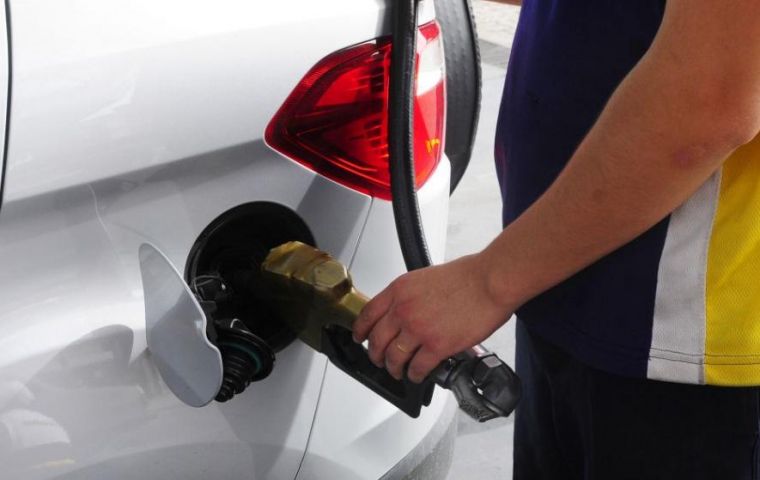MercoPress. South Atlantic News Agency
Price of fuel goes down in Uruguay as of September
 Without a new adjustment to the PPI formula there would have been no price cut
Without a new adjustment to the PPI formula there would have been no price cut The Government of Uruguay Monday announced a small reduction in the price of fuel at pumps due to the use -for the first time- of the new Import Parity Price (PPI) adjustment formula devised by the current administration.
It was the first reduction in the price of gasoline and diesel since the new adjustment scheme began in June, which takes as a reference the Import Parity Price (PPI) calculated by the Regulatory Unit of the Energy and Water Services (Ursea).
Starting September 1, one liter of Super gasoline will go down from UY $ 70.8 (US $ 1.66) to UY $ 70.41 (US $ 1.65), while diesel falls from UY $ 50.7 (US $ 1.19) to 49.94 (US $ 1.17) and Premium gasoline descends from UY $ 72.75 (US $ 1.71) to UY $ 72.34 (US $ 1.7), a reduction of 0.55%; 1.5% and 0.56% respectively.
Before the PPI system was introduced to adjust prices each month, there had been an increase of 12% on average in June, 0.5% in gasoline and 0.9% in diesel in July, and of 7.6 % and 10.9% respectively at the beginning of August.
The PPI is a formula expressing how much it would cost to supply the local market under the same conditions as the state oil company (Ancap). Last Friday, Ursea had issued a report which the Executive took into account to determine the new values.
The Ursea data, which calculates the price at the exit of the Ancap refining plant - that is, without the taxes associated with the price or the margins of freight, distributors and service stations - showed that the PPI of Super naphtha fell 0.76% last month, Premium fell 0.79% and Diesel oil fell 2.15%.
Although the PPI and the pump value should supposedly follow the same trend, there is no direct transfer in percentage terms because when the costs of the secondary chain are added - what happens outside of Ancap - slight variations may occur.
According to a new decree published over the weekend, the Government introduced some changes to the PPI formula. Instead of the value of crude from the 16th of one month to the 15th of the next, now authorities will have to measure it between the 26th of one month to the 25th of the next.
The measure was said to be aimed at bringing down the time gap between the Ursea report and the change in pump prices, to avoid speculation among market players and consumers.
The PPI is also not linked to the barrel of Brent crude traded on international markets, but rather to the FOB value of gasoline and diesel from the refinery.
Uruguay's Ministry of Industry, Energy and Mining (MIEM) said in a statement that “the monthly reduction [of fuels] responds to a decline in refined products on the Gulf (of Mexico) Coast -which represent more than 80% of the PPI- derived from the fall in the price of oil.”
The new adjustment system arises from the controversial Law of Urgent Consideration (LUC) which the opposition wants to be repealed through a referendum. The LUC “guarantees that the real evolution of fuel price costs, both downward and upward, will be reflected in the values to the public, eliminating fiscal discretion.”
Ursea director on behalf of the opposition Broad Front (FA), Roberto Chiazzaro explained that without the change in dates, that is if things had been measured according to changes between July 16 and August 15, “there would have been a minimal upward variation” of the PPI. Hence, without the decree, the first reduction in the price of fuel with the new scheme would not have taken place.
Chiazzaro also said that the PPI was “not a useful tool” to take as a reference each month, because it transfers oil fluctuations to the domestic market. Instead, he said that this calculation should be used as a theoretical reference to compare with the prices at which Ancap sells -as was done under FA governments- but keeping adjustments to the public more widely spaced in time.
He also stressed that the monthly variation in prices has an impact on Ancap's finances because between the time Ancap buys crude and sells it once refined the prices at pumps may not reflect the actual cost of the product.




Top Comments
Disclaimer & comment rulesCommenting for this story is now closed.
If you have a Facebook account, become a fan and comment on our Facebook Page!